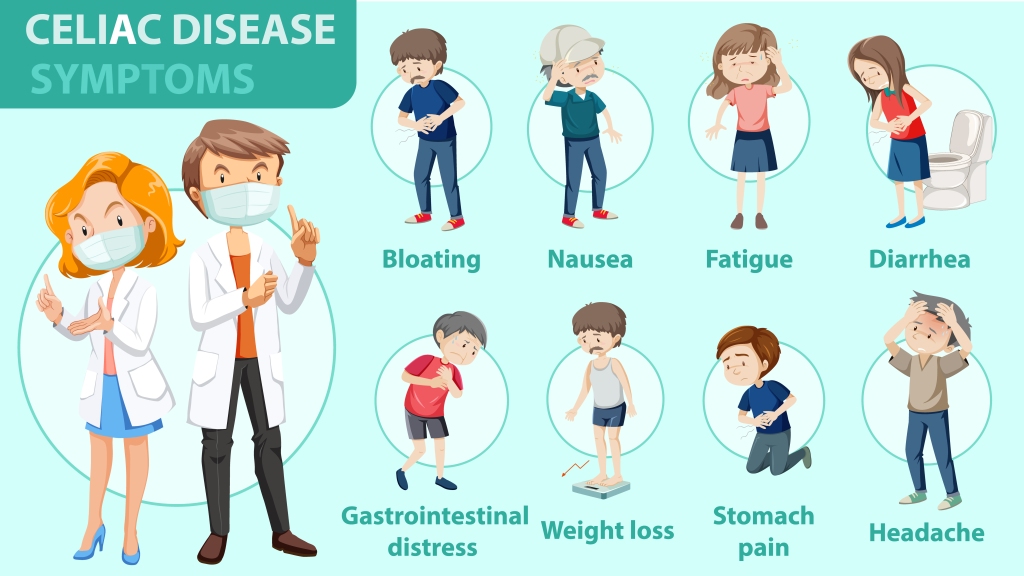
What is celiac disease?
Celiac disease is an autoimmune disorder that mainly occurs in genetically predisposed people. Celiac disease mainly occurs due to the ingestion of gluten (natural protein found in grains like wheat, barley etc.). This ingestion leads to the damage of small intestine. This ingestion damages the lining of the small intestine to an extent where the absorption of some nutrient is prevented. This complication is also called as malabsorption. This is majorly an immunogenic reaction to the eating of food that includes high amount of gluten. In order to avoid this there should be proper gastro care.
What are the early warning signs of celiac disease?
- Signs of glucose intolerance are also the signs of celiac disease. Celiac disease can be identified by these common characteristics or symptoms:
- Diarrhoea: Loose, watery stool is one of the most common symptoms that is experienced by the patients before being diagnosed by celiac disease.
- Bloating is another celiac disease related common symptom.
- Excess production of gas is a common digestive issue which is also seen in people suffering from celiac disease.
- Fatigue or decreased energy is also an issue faced by people with celiac disease.
- Iron deficiency or anaemia
- Weight loss
- Itchy rash: Celiac disease may also cause dermatitis herpetiformis. It mainly occurs in elbows, knees and buttocks.
- Constipation: In some people celiac disease may also cause constipation in place of diarrhoea.
- Depression: It is a psychological symptom observed along with various physical symptoms in patients with celiac disease.
- Celiac disease may also lead to tooth discoloration of teeth from white to yellow.

How is Celiac Disease tested and diagnosed by a Gastroenterologist?
Gastro doctors are the ones to be consulted when diagnosed by gastroenterologist. Four prominent methods to detect celiac disease are:
- Serology testing: This test mainly looks for antibodies in the body that regulates the immune response towards the reaction to gluten. The levels of these antibodies in the body are elevated during the immune response towards gluten.
- Genetic testing: This testing is mainly done to rule out the chances of celiac disease from the beginning. The genes that are tested are HLA-DQ2 and HLA-DQ8 that when detected can be used as a precaution warning for probable celiac disease.
- Endoscopy: It is a device which has a long tube with a tiny camera that is put into the mouth and passed down the throat. The camera helps the doctor to take a view of the small intestine and take a small tissue sample (biopsy) to analyse the damage to the villi of the intestine.
- Capsule endoscopy: This test uses a wireless camera to take a picture of the small intestine. The camera is enclosed in the capsule which is swallowed and travels through the digestive tract. The camera then takes a thousand pictures which is then transmitted to the recorder.
If you have celiac disease, what kind of doctor treats celiac disease?
Sprint medical can get you consult with the best stomach specialist in Allahabad and the gastroenterologist in Allahabad some of the primary care providers that work towards treating the celiac disease are the following.
- Gastroenterologist: Focuses of digestive system and its related disorders.
- Nutritionist: Specializes in food and diet
- Pediatrician: Provides medical care for infants, children and teenagers.
- Primary care provider: Conducts an assessment, diagnoses, plans a diet in order to decrease the symptoms of the disease and conducts follow-ups with the patient.
Celiac disease and what foods to eat and avoid:
- A regular follow up visit to the doctor should be followed and the diet set should be followed all through life.
- In order to follow the gluten free diet, the patient is prevented from eating pasta, cereal and any other food containing gluten.
- Some less obvious sources containing gluten are ice-cream and salad dressing. Cross contamination is another source of gluten which happens when gluten free food comes accidently into contact with gluten containing food.
- A person suffering from celiac disease should always follow a well-balanced diet. The diet should be made up of other types of flour like potato, rice, corn and soy.
- Further, in order to prevent the disease fresh fruit consumption is an integral part. The fruits should be fresh and not processed as artificial food contains gluten.
Take home message
In case of celiac disease proper care should be taken of the diet we consume (gluten free) and the testing of the disease related gene should be proper. Simple and fresh diet along with lifestyle tradition is effective in improving digestion. Ditch food with gluten and maintain a proper diet celiac disease can be evaded.

Leave a comment